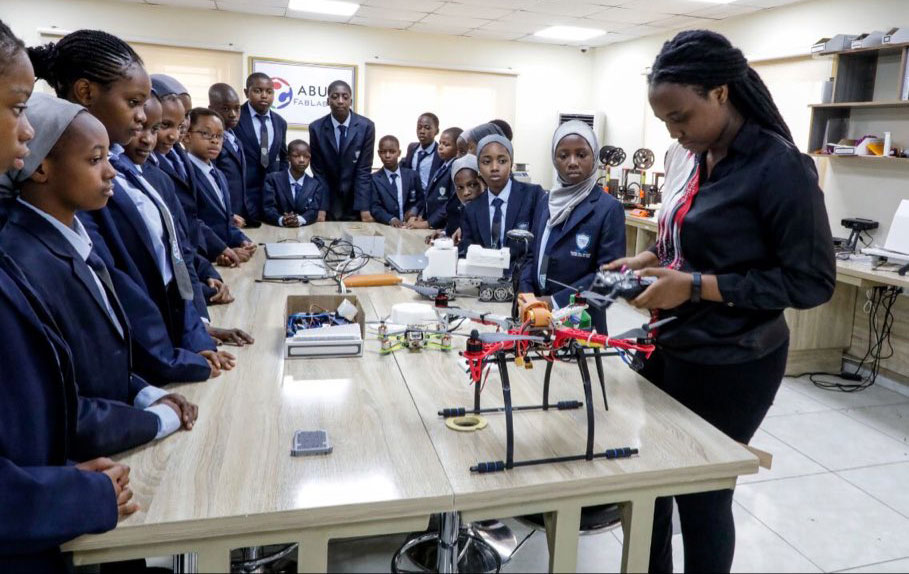The integration of Artificial Intelligence (AI) into governance presents both opportunities and challenges for African democracies. A report by Research ICT Africa highlights how the impact of AI on democratic processes depends on the policies and regulations governing its use. Effective AI governance can enhance transparency and efficiency, but without proper regulation, AI risks exacerbating issues like corruption and disinformation. This article looks at how Nigeria and Ghana are navigating AI’s complexities within their governance frameworks.
In November 2020, Nigeria’s then Minister for Information, Communication, and Digital Economy, Dr Isa Pantami, inaugurated the National Centre for Artificial Intelligence and Robotics (NCAIR) in Abuja. As the first centre of its kind in Africa, NCAIR reflects the ambitions of Nigeria’s National Digital Economy Policy and Strategy (NDEPS) 2020-2030, launched in 2019. The strategy identifies AI as a key pillar for advancing the digital economy and aims to leverage digital technologies for economic growth and improving governance.

NCAIR, a digital laboratory for advancing AI skills development and innovation, was launched as a response to a directive for agencies under the Ministry of Communications and Digital Economy to formulate practical strategies for enhanced implementation of the digital economy, according to a November 2021 policy brief published by Paradigm Initiative (PI), an organisation that works to create improved livelihoods for underserved young Africans through digital inclusion and digital rights programmes.
The PI, which has offices in several countries, including Democratic Republic of Congo (DRC), Kenya, Senegal, Zambia, and Zimbabwe, said Nigeria, which has 103 million internet users – the most of any country on the continent – was beginning to formulate more laws, policies and guidelines to regulate AI use and application.
“A national policy on AI is critical for the country, and therefore, the Nigerian government and other relevant stakeholders [must] think carefully about how this policy can be created to support an AI economy that will maintain standards like algorithmic accountability, data protection, the explainability of decision-making by machine-learning models, and the protection of citizens’ human rights from infringements,” the PI brief said. “The formulation of this policy requires an understanding of how AI and other related technology developments can be used to achieve Nigeria’s national goals and help solve many local problems ranging from food security to healthcare.”
The brief also noted that AI was transforming the workforce and its use would increase in the decades ahead. “With a median age of about 18 years, and recording the second-highest unemployment rate globally, Nigeria must massively expand upskilling and reskilling efforts within its teeming workforce to leverage the opportunities of the fourth industrial revolution and to sustain the nation’s labour economy.”
In an interview with Africa in Fact, Dr Olusola Sayeed Ayoola, the CEO of Robotics and Intelligence Nigeria, a technology hub and research centre, said AI could also be a tool against corruption by providing an intelligent method to assess government programmes. It could also be used to monitor government contracts by tracking their progress, ensuring compliance and reducing corruption. He agreed that it was also a tool for helping to support public policy formation, including more targeted policies to improve the lives of young people.
“AI can, for instance, analyse demographics and the employment and healthcare needs of youth to identify areas where they are underserved or overlooked,” he said. “AI can also be used to analyse social media and other online feedback from them to better understand their needs and preferences.”
Ayoola stressed the importance of regulating AI to prevent misuse, suggesting a regulatory council of AI experts. “This council could oversee AI applications and technology, ensuring they align with ethical standards and societal standards,” he told Africa in Fact. “The government could also validate the AI training curriculum and monitor and detect rogue AI systems.”
An article in the MIT Technology Review, published in March this year, described the projected benefit of AI adoption on Africa’s economy as “tantalising”, saying that, according to estimates, “four African countries alone – Nigeria, Ghana, Kenya, and South Africa – could rake in up to $136 billion worth of economic benefits by 2030 if businesses there begin using more AI tools.”
Ghana shares Nigeria’s enthusiasm for AI but faces distinct challenges in regulation. A 2021 International Bar Association report highlighted the lack of a formal AI regulatory framework in Ghana, noting that there would clearly be a need for one. Nonetheless, a UNESCO report the same year recorded the Ghanaian government’s interest in developing AI policies, though concrete actions had yet to materialise.
Earlier this year, however, Ghana’s Finance Minister Mohammed Amin Adam said the country would work closely with other countries on the continent and development partners, such as the IMF, the World Bank and the African Development Bank (AfDB), among others, to provide funding, technical and implementation support for AI projects, as well as the development of national AI strategies. In the meantime, Ghana has already developed a digital national identity card and is extending fibre connectivity in the country.
Nigeria and Ghana’s experiences illustrate AI’s multifaceted challenges and opportunities in governance. Effective regulation and ethical AI use are essential to harnessing its potential benefits while mitigating risks. Both countries are on a journey to integrate AI into their governance frameworks, with success depending on robust policies, ethical standards, and collaborative efforts to address disinformation and other emerging challenges.

Tony Ademiluyi is a Nigerian and Lagos-based freelance journalist and writer. His works have appeared in leading Nigerian newspapers including Punch, Nation, Guardian, Vanguard, This Day, Daily Independent, Sahara Reporters, and Daily Post among many others. His works have also been published in reputable African magazines like The Africa Report and Africa Today. He has also written an unpublished novel set in Nigeria about the plight of the gay community in a largely homophobic society. He is a lifelong Manchester United fan and loves reading, political and historical discourse as well as swimming.


